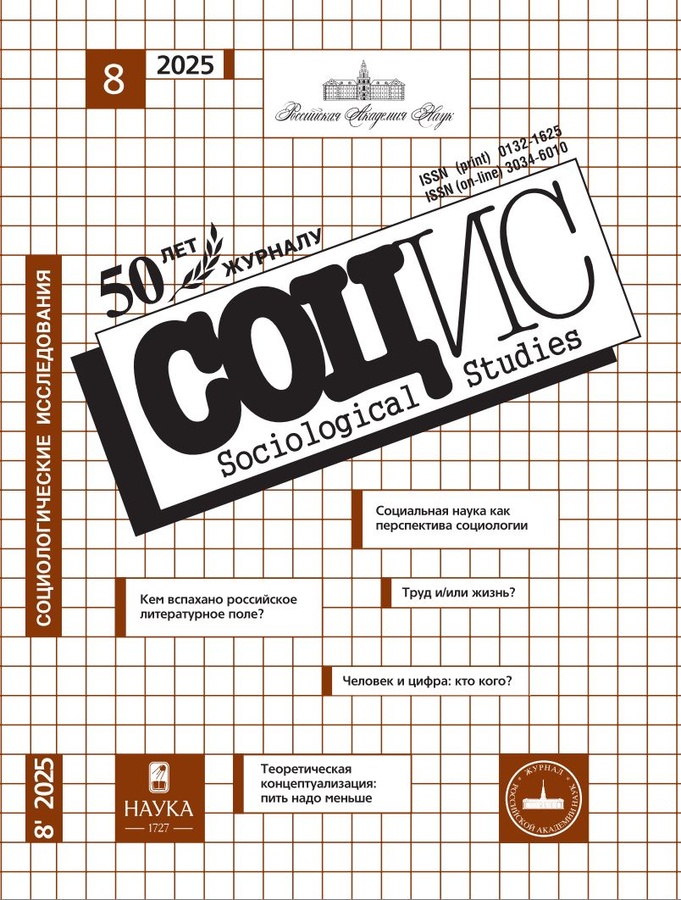The Russian Literary Field in the 21st Century: Assessing its State Through Interviewing the Critics
- Autores: RIAZANTSEV A.P.1
-
Afiliações:
- HSE University
- Edição: Nº 8 (2025)
- Páginas: 132-141
- Seção: CULTURAL SOCIOLOGY
- URL: https://freezetech.ru/0132-1625/article/view/693346
- DOI: https://doi.org/10.31857/S0132162525080112
- ID: 693346
Citar
Texto integral
Resumo
The study examines the transformation and disintegration of institutional structures within the Russian literary process during the 21st century, analyzing how post-Soviet commercialization and digitalization have reshaped the field. Through interviews with 35 literary critics, the research traces evolving forms of literary existence, recognition mechanisms, and the changing status of writers. Building on Bourdieu’s field theory, the work documents a paradigm shift from hierarchical, institutionally-embedded systems to fragmented, networked and unstable configurations of the literary field. The findings reveal literature’s adaptive capacity despite the crisis of traditional institutions, demonstrating how creative work maintains symbolic value while losing former economic and institutional support. These transformations represent a social process generating new forms of cultural agency among writers, critics, publishers and digital platforms. Hybrid interaction formats emerge between: authors and readers, literary institutions and commercial structures, traditional media and social networks. Consequently, a text’s symbolic value now derives not just from traditional arbiters (writers’ unions, established journals) but equally from networked communities, platform algorithms and market mechanisms. This dual legitimization creates constant tension between autonomous artistic principles and heteronomous market/digital logics. The study ultimately maps how Russian literature negotiates its position amid competing value systems, where institutional authority coexists with decentralized, algorithmically-driven recognition processes in the digital age.
Bibliografia
- Бурдье П. Поле литературы // НЛО. 2000. № 5. С. 22–87.
- Даниленко Ю. Ю., Крендель А. Б. Массовая литература в современной России: вызовы цифровой эпохи // Вестник ПермГУ. Российская и зарубежная филология. 2019. Т. 11. Вып. 2. С. 86–93.
- Дубин Б. В. Очерки по социологии литературы. М.: НЛО, 2017.
- Головнёва А. В. «Миры легитимности»: стратегии легитимации писателей-прозаиков в российском поле литературы // Экономическая социология. 2015. Т. 16. № 1. С. 38–62.
- Иванова Н. Б. Текст и контекст: работы о новой русской словесности. М.: Время, 2024.
- Капцев В. А. Трансформация образа современного писателя: от общественного статуса к медийному имиджу. Минск: БГУ, 2014.
- Культ-товары: массовая литература современной России между буквой и цифрой: сб. науч. ст. СПб.: РГПУ им. А. И. Герцена, 2018.
- Рейтблат А. И. Писать поперек: статьи по биографике, социологии и истории литературы. М.: НЛО, 2014.
- Сапиро Ж. Французское поле литературы: структура, динамика и формы политизации // Журнал социологии и социальной антропологии. 2004. Т. 7. № 5. С. 126–143.
- Dubois S. The price of rhymes: The evolution of poets’ status throughout history // Poetics. 2018. Vol. 70: 39–53. doi: 10.1016/j.poetic.2018.07.002.
- Habinek J. How the Nobel became a world prize: Scalar mediation in the global literary field // Poetics. 2023. Vol. 100. October. doi: 10.1016/j.poetic.2023.101822.
Arquivos suplementares










